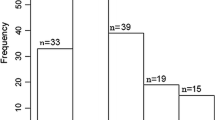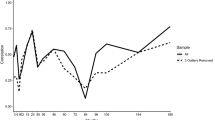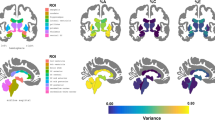Prospective memory slips (forgetting to do something) are as part of everyday memory failure as retrospective complaints (forgetting a past event). The extent to which genes influence prospective and retrospective memory is so far unclear. This study aims to quantify the relative genetic and environmental influences on such memory slips and seeks to identify QTL’s with the first genome-wide scan for such traits. A classic twin design was implemented: comprising 896 monozygotic (MZ) and 1008 dizygotic (DZ) female twin pairs aged between 19 and 85 (mean age, 51) participated. The prospective and retrospective memory questionnaire (PRMQ) consists of 16 items, eight asking about prospective memory failures and eight concerning retrospective failures. Heritability for prospective memory and retrospective memory were found to be 44% and 41%, respectively. A genome- wide scan of 489 female DZ twin pairs suggested a QTL on chromosome 12q22 for prospective memory (LOD 2.76, empirical p-value 0.0006). Within this QTL lies an obvious candidate—the SCAD gene. These results suggest that large-scale gene discovery studies are possible with self-report memory questionnaires.


Similar content being viewed by others
References
Aartsen, M. J., Martin, M., and Zimprich, D. (2004). Gender differences in level and change in cognitive functioning. Results from the Longitudinal Aging Study Amsterdam. Gerontology 50(1):35–38
Allison, D. B., Neale, M. C., Zannolli, R., Schork, N. J., Amos, C. I., and Blangero, J. (1999). Testing the robustness of the likelihood-ratio test in a variance-component quantitative-trait loci-mapping procedure. Am. J. Hum. Genet. 65(2):531–544
Andrew, T., Hart, D. J., Snieder, H., de Lange, M., Spector, T. D., and MacGregor, A. J. (2001). Are twins and singletons comparable? A study of disease-related and lifestyle characteristics in adult women. Twin. Res. 4(6):464–477
Blangero, J., Williams, J. T., and Almasy, L. (2001). Variance component methods for detecting complex trait loci. Adv. Genet. 42:151–181
Cockburn, J. and Smith, P. T. (1991). The relative influence of intelligence and age on everyday memory. J. Gerontol. 46(1):31–36
Crawford, J. R., Smith, G., Maylor, E. A., Della, S. S., and Logie, R. H. (2003). The Prospective and Retrospective Memory Questionnaire (PRMQ): Normative data and latent structure in a large non-clinical sample. Memory 11(3):261–275
Derouesne, C., Lacomblez, L., Thibault, S., and LePoncin, M. (1999). Memory complaints in young and elderly subjects. Int. J. Geriatr. Psychiatry 14(4):291–301
Dib, C., Faure, S., Fizames, C., Samson, D., Drouot, N., Vignal, A., Millasseau, P., Marc, S., Hazan, J., Seboun, E., Lathrop, M., Gyapay, G., Morissette, J., and Weissenbach, J. (1996). A comprehensive genetic map of the human genome based on 5,264 microsatellites. Nature 380(6570):152–154
Driscoll, I., McDaniel, M. A., and Guynn, M. J. (2005). Apolipoprotein E and prospective memory in normally aging adults. Neuropsychology 19(1):28–34
Eysenck, M. W. and Keane, M. T. (2000). Cognitive Psychology: A Student’s Handbook. 4th edn. Hove, UK: Psychology Press
Fulker, D. W. and Cherny, S. S. (1996). An improved multipoint sib-pair analysis of quantitative traits. Behav. Genet. 26(5):527–532
Guillem, F. and Mograss, M. (2005). Gender differences in memory processing: evidence from event-related potentials to faces. Brain Cogn. 57(1):84–92
Jonker, C., Geerlings, M. I., and Schmand, B. (2000). Are memory complaints predictive for dementia? A review of clinical and population-based studies. Int. J. Geriatr. Psychiatry 15(11):983–991
Jonker, C., Launer, L. J., Hooijer, C., and Lindeboom, J. (1996). Memory complaints and memory impairment in older individuals. J. Am. Geriatr. Soc. 44(1):44–49
Kvavilashvili, L. (1987). Remembering intention as a distinct form of memory. Brit. J. Psychol. 78:507–518
Kyvik, K. O. (1999). Generalisability and assumptions of twin studies. In T. D. Spector, H. Snieder and A. J. MacGregor (eds.), Advances in twin and sib-pair analysis. London: Greenwich Medical Media, pp. 67–77
Lander, E. and Kruglyak, L. (1995). Genetic dissection of complex traits: guidelines for interpreting and reporting linkage results. Nat. Genet. 11(3):241–247
Little, M. M., Williams, J. M., and Long, C. J. (1986). Clinical memory tests and everyday memory. Arch. Clin. Neuropsychol. 1(4):323–333
Lowe, C. and Rabbitt, P. (1998). Test/re-test reliability of the CANTAB and ISPOCD neuropsychological batteries: theoretical and practical issues. Cambridge Neuropsychological Test Automated Battery. International Study of Post-Operative Cognitive Dysfunction. Neuropsychologia 36(9):915–923
Maitland, S. B., Herlitz, A., Nyberg, L., Backman, L., and Nilsson, L. G. (2004). Selective sex differences in declarative memory. Mem.Cognit. 32(7):1160–1169
Mantyla, T. (2003). Assessing absentmindedness: prospective memory complaint and impairment in middle-aged adults. Mem.Cognit. 31(1):15–25
Marsh, R.L. and Hicks, J. L. (1998). Event-based prospective memory and executive control of working memory. J. Exp. Psychol. Learn. Mem. Cogn 24(2):336–349
Marsh, R. L., Hicks, J. L., and Landau, J. D. (1998). An investigation of everyday prospective memory. Mem.Cognit. 26(4):633–643
Martin, N. G. and Martin, P. G. (1975). The inheritance of scholastric abilities in a sample of twins. I. Ascertainments of the sample and diagnosis of zygosity. Ann. Hum. Genet. 39(2):213–218
McDaniel, M. A., Robinson-Riegler B., and Einstein G. O. (1998). Prospective remembering: perceptually driven or conceptually driven processes?. Mem. Cognit. 26(1):121–134
Meacham, J. A. and Singer, J. (1977). Incentive in prospective remembering. J. Psychol. 97:191–197
Mizumori, S. J., Perez, G. M., Alvarado, M. C., Barnes, C. A., and McNaughton, B. L. (1990). Reversible inactivation of the medial septum differentially affects two forms of learning in rats. Brain Res. 528(1):12–20
Morris, P. E. (1992). Prospective memory: Remembering to do things. In: M. Gruneberg and P. Morris (eds.), Aspects of memory: Vol 1. The practical aspects. London: Routledge
Neale, M., Boker, S. M., Xie, G., and Maes, H. H. (1999). Mx: Statistical Modelling. 5th edn. Department of Psychiatry: Richmond
Neale, M. and Cardon, L. R. (1992). Methodology for genetic studies of twins and families. Dordrecht, the Netherlands: Kluwer Academic
Pritchard, L. E., Kawaguchi, Y., Reed, P. W., Copeman, J. B., Davies, J. L., Barnett, A. H., Bain, S. C., and Todd, J. A. (1995). Analysis of the CD3 gene region and type 1 diabetes: application of fluorescence-based technology to linkage disequilibrium mapping. Hum. Mol. Genet. 4(2):197–202
Rabbitt, P. and Abson, V. (1990). ‘Lost and found’: some logical and methodological limitations of self-report questionnaires as tools to study cognitive ageing. Br. J. Psychol. 81(Pt 1):1–16
Reed, P. W., Davies, J. L., Copeman, J. B., Bennett, S. T., Palmer, S. M., Pritchard, L. E., Gough, S. C., Kawaguchi, Y., Cordell, H. J., and Balfour, K. M. (1994). Chromosome-specific microsatellite sets for fluorescence-based, semi-automated genome mapping. Nat.Genet. 7(3):390–395
Robbins, T. W., James, M., Owen, A. M., Sahakian, B. J., McInnes, L., and Rabbitt, P. (1994). Cambridge Neuropsychological Test Automated Battery (CANTAB): a factor analytic study of a large sample of normal elderly volunteers. Dementia 5(5):266–281
Schack, B., Klimesch, W. and Sauseng, P. (2005). Phase synchronization between theta and upper alpha oscillations in a working memory task. Int. J. Psychophysiol.
Schofield, P. W., Marder, K., Dooneief, G., Jacobs, D. M., Sano, M., and Stern, Y. (1997). Association of subjective memory complaints with subsequent cognitive decline in community-dwelling elderly individuals with baseline cognitive impairment. Am. J. Psychiatry 154(5):609–615
Sellen, A. J., Louie, G., Harris, J. E., and Wilkins, A. J. (1997). What brings intentions to mind? An in situ study of prospective memory. Memory 5(4):483–507
Singer, J. J., Cherkas, L. F., MacGregor, A. J., and Spector, T. D. (2005). Where did I leave my keys? A twin study of self-reported memory ratings using the multifactorial memory questionnaire. Twin. Res. Hum. Genet. 8(2):108–112
Snieder, H. (1999). Path analysis of age-related disease traits. In T. D. Spector, H. Snieder, and A. J. MacGregor (eds.), Advances in twin and sib- pair analysis. London: Greenwich Medical Media, pp. 119–130
Spector, T. D., Cicuttini, F., Baker, J., Loughlin, J., and Hart, D. (1996). Genetic influences on osteoarthritis in women: a twin study. BMJ 312(7036):940–943
Spector, T.D., MacGregor, A.J. (2002). The St. Thomas’ UK Adult Twin Registry. Twin Res. 5(5):440–443
Tafti, M., Petit, B., Chollet, D., Neidhart, E., de, B. F., Kiss, J. Z., Wood, P. A., and Franken P. (2003). Deficiency in short-chain fatty acid beta-oxidation affects theta oscillations during sleep. Nat. Genet. 34(3):320–325
Thapar, A., Petrill, S. A. and Thompson, L. A. (1994). The heritability of memory in the Western Reserve Twin Project. Behav.Genet. 24(2):155–160
Troyer, A. K. and Rich, J. B. (2002). Psychometric properties of a new metamemory questionnaire for older adults. J. Gerontol. B Psychol. Sci. Soc. Sci. 57(1):19–27
Wilson, S. G., Reed, P. W., Bansal, A., Chiano, M., Lindersson, M., Langdown, M., Prince, R. L., Thompson, D., Thompson, E., Bailey, M., Kleyn, P. W., Sambrook, P., Shi, M. M., Spector, T. D. (2003). Comparison of genome screens for two independent cohorts provides replication of suggestive linkage of bone mineral density to 3p21 and 1p36. Am. J. Hum. Genet. 72(1):144–155
Winson, J. (1978). Loss of hippocampal theta rhythm results in spatial memory deficit in the rat. Science 201(4351):160–163
Acknowledgments
This work was supported by The Chronic Disease Research Foundation and the Worshipful Company of Actuaries who provided a fellowship for JS and the Wellcome Trust for support of TwinsUK.
Author information
Authors and Affiliations
Corresponding author
Rights and permissions
About this article
Cite this article
Singer, J., Falchi, M., MacGregor, A. et al. Genome-wide Scan for Prospective Memory Suggests Linkage to Chromosome 12q22. Behav Genet 36, 18–28 (2006). https://doi.org/10.1007/s10519-005-9011-1
Received:
Accepted:
Published:
Issue Date:
DOI: https://doi.org/10.1007/s10519-005-9011-1




